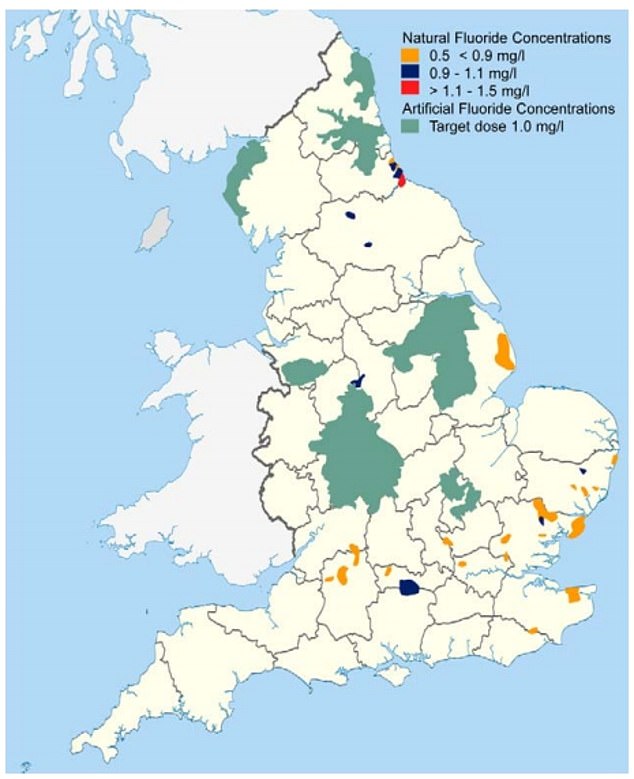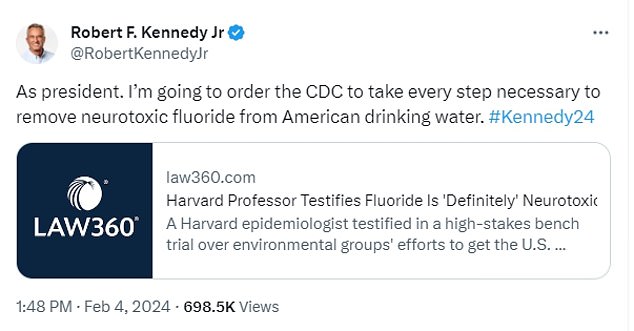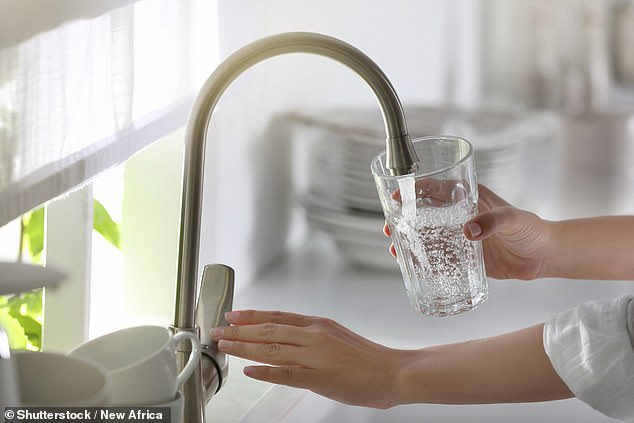Millions more Britons will receive fluoride in their drinking water under Government plans.
As part of the long-awaited dental recovery plan, ministers have promised to embark on the biggest expansion of fluoridation since the 1980s.
Around 1.6 million people in the North East, if the controversial proposals are approved, will initially get the mineral added to their water supplies.
Ministers say their long-term ambition is to bring fluoride to more of the country, with a “particular focus” on deprived areas.
Fluoride helps strengthen the tough outer protective layer of your teeth, called enamel, which in turn protects your teeth from damage and wear.
Millions more Britons will have fluoride added to their tap water in a government scheme to improve their oral health (file image)

According to the British Fluoridation Society, only 6.1 million Britons (around 10 per cent of the population) currently receive water with sufficient fluoride levels to benefit oral health. These areas include Hartlepool, Easington, parts of North Hampshire and South Berkshire.
But adding fluoride to the water supply is not without controversy.
Some studies have linked excessive amounts of the mineral to babies born with Down syndrome, as well as kidney stones and some types of cancer.
However, the NHS and experts such as the government’s chief medical officer, Sir Chris Whitty, say these claims are not supported by evidence, with the latter previously describing them as “exaggerated and without evidence”.
Around 5.8 million Britons live in areas where fluoride (also added to toothpaste and mouthwash) is already found in tap water.
And 300,000 supplies of naturally fluoridated drinks from the rocks in the ground.
In total, only 10 per cent of the UK population currently gets water with sufficient levels of fluoride, according to the British Fluoridation Society.
Health chiefs have estimated that adding fluoride to more water supplies could prevent two-thirds of hospital admissions for cavities – an issue costing the NHS and, by extension, taxpayers millions.
While fluoride has been added to water in the UK, a process called fluoridation, expansion of the scheme has largely stalled since the 1980s.
Modern attempts to bring aid closer to British communities have largely failed during the consultation stage, with the public unconvinced of the benefits compared to the perceived risk.
Fluoridation is a hot topic in the US, with presidential hopeful Robert F. Kennedy Jr earlier this week calling it “neurotoxic” and vowing to eliminate it from drinking supplies if elected.
The Government’s dental recovery plan, published this week, includes fluoridation as a central component.
“With the new legislation, we have simplified the initiation of new water fluoridation programs,” it reads.
“Our long-term ambition is to systematically bring fluoridation to more of the country, with particular attention to the most deprived areas, which will benefit the most from fluoridation.”
The plan also states that despite the benefits of fluoridation to public dental health, there has been no “significant” expansion of the plan since the 1980s.
It noted that only one in 10 people in England drink water containing the mineral, compared to almost three in four in Ireland and the United States, and nine in 10 Australians.
In 2021, Professor Whitty and his colleagues said that if all five-year-old children with drinking water containing less than 0.2 milligrams per liter (mg/l) of fluoride started drinking water increased to 0.7 mg/l , the number of cavities would decrease by up to 28 percent among the poorest communities.

Fluoridation is a hot topic in the US, with presidential hopeful Robert F. Kennedy Jr earlier this week calling it “neurotoxic” and vowing to eliminate it from drinking supplies if elected.
Fluoridation is considered a low-cost, high-impact public health initiative as it is passive and does not depend on people actively changing their behavior compared to encouraging them to stop smoking, exercise more, or eat healthier foods.
But some experts have argued that since fluoride is now added to various toothpastes and mouthwashes, adding it to tap water is not as beneficial as it once was.
While the more serious dangers of fluoridation are a point of controversy, a lesser known risk is fluorosis.
This occurs when a child has too much fluoride while their teeth are developing, causing very white lines to appear on the teeth when they are mild and tooth discoloration when they are severe.
It is partly for this reason that the World Health Organization recommends that fluoride in the drinking water supply should not exceed 1.5 mg/l.
The risk of fluorosis in the UK is considered low because fluoride levels in drinking water are carefully monitored in Britain.
Some 25 countries around the world already add fluoride to tap water, including Ireland, most of the United States and Australia.
Other parts of Prime Minister Rishi Sunak’s bold plan to improve dental care in England include solving the NHS dental appointment crisis affecting millions.
Under the scheme, dentists will be offered up to £50 to see patients who have not had a check-up in the last two years.
Up to 240 dentists who wish to relocate to the country’s “dental deserts”, where people struggle to get appointments, will also receive a £20,000 “golden hello” for doing so.
But the plan, unveiled 10 months after it was promised, has been criticized by dental bosses and politicians for not going far enough, with one saying it amounted to “rearranging the deckchairs”.
Instead, health leaders called for a “radical reform” of the dental contract, which governs how much dentists are paid to carry out NHS work, accusing Mr Sunak of doing a U-turn on his promise to restore the industry paralyzed.
The crisis in NHS dentistry has been brewing for years, with some Britons forced to pull their teeth out with pliers or travel abroad to see a dentist due to a lack of places in the UK.
One even went to war-torn Ukraine because it was half the price of paying privately.
Others have queued since 4am to get a place at dental surgeries that have opened their list to NHS patients.
Shocking images of hundreds of desperate Brits queuing outside a newly opened clinic in Bristol this week were described as “reminiscent of Soviet-era Eastern Europe”.
The queue, which lasted six hours on the first day and then continued for a second day, eventually saw dozens of patients turned away because the surgery had run out of patient spaces.


